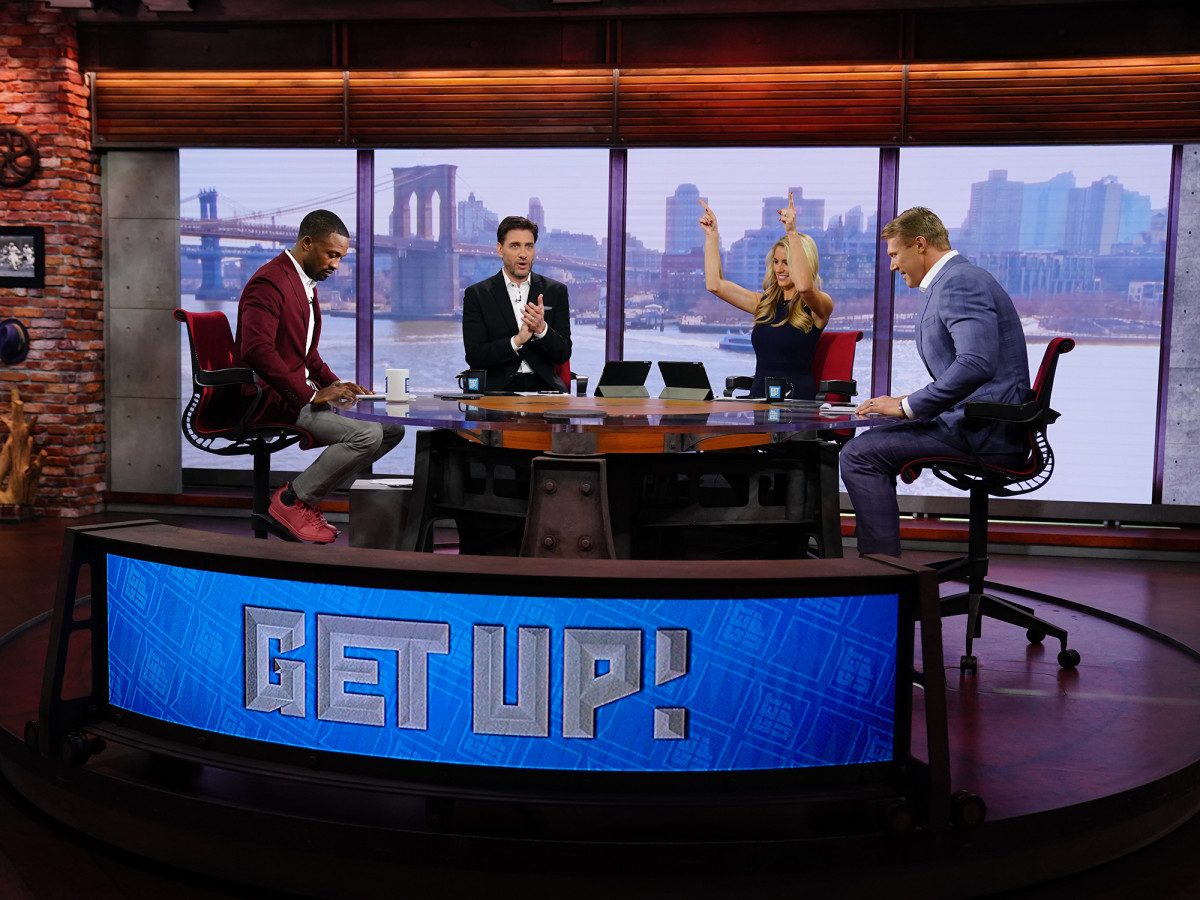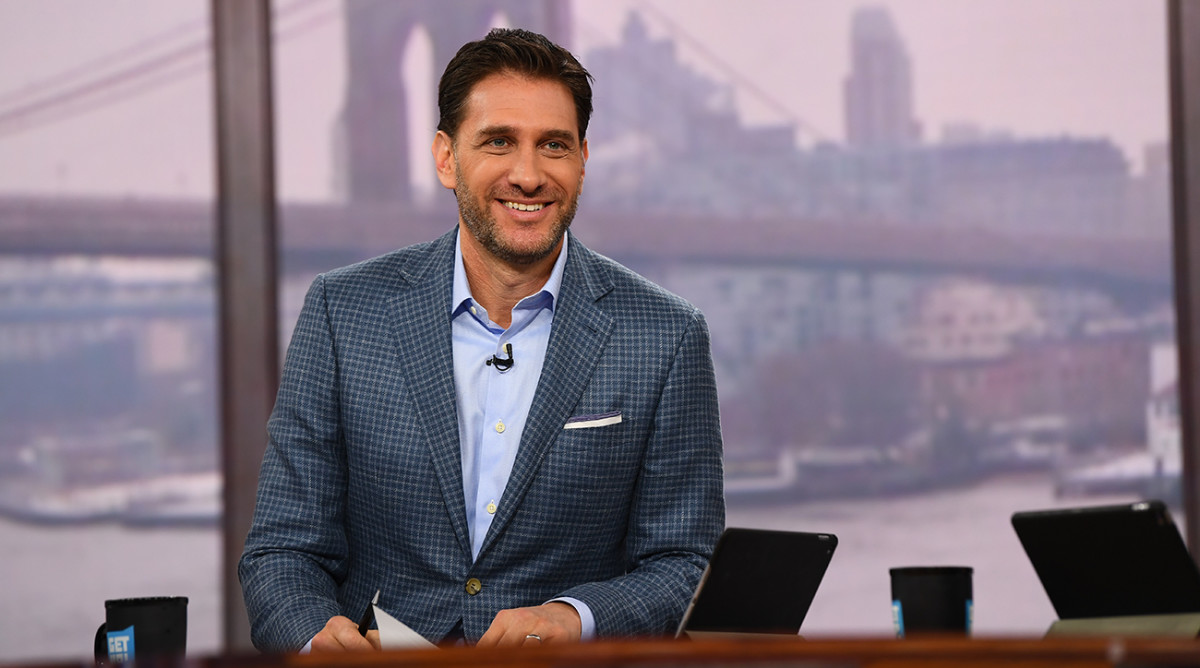After One Year on Air, Get Up! Host Mike Greenberg Assesses the Show's Future

“A show needs to be moving at all times,” Get Up! host Mike Greenberg says. Explaining this conviction, he has jabbed both of his pointer fingers onto his desk, where he tracks an imaginary broadcast from left to right. Slowly, his right hand strays away from him. “It doesn’t always have to move in the direction you planned,” he says. “So long as it’s moving forward, that’s okay…. So long as it doesn’t stop or start moving backwards, it’s good.”
The demonstration is meant to refer to how a single, two-hour program should work, but it might as well apply to Get Up!’s run to this point as well. A few moments earlier, Greenberg had propped his leg on his desk, unwinding. A couple minutes before that, he was on set exactly one year after ESPN launched its ambitious morning show from a fresh New York studio. There was little fanfare for the anniversary.
Get Up! has changed in ways big and small since Day 1. Michelle Beadle spoke the first words on the show’s debut episode. But four months later, she was out. That was a big change. Greenberg wore a sweater that morning; now he sticks with blazers—a smaller switch. An experimental word-of-the-day gag didn’t last, while the building’s outdoor locations haven’t been used much since the premiere, when Booger McFarland analyzed the Masters from the roof amidst a blizzard.
From a ratings perspective, the show had “a rough start,” struggling to match the audience for comparable SportsCenter episodes. Breitbart used it as fodder and the New York Postwrote that it “has been an epic failure” in August. But now it’s ESPN using viewership numbers to bolster its case, citing four straight months of increased average viewing time. In March, Get Up! beat last year’s SportsCenter audience by 7% (333,000 vs. 318,000). It’s not a runaway success story, but it’s something. These days, Maria Taylor and Laura Rutledge often take Beadle’s place at the Get Up! desk, while Jalen Rose carries more responsibility to provide soundbites.

“You can’t ever figure out how to get something right until you get it at least a little bit wrong,” Greenberg says. A year in, the show’s ultimate mission hasn’t changed, and Greenberg’s commitment remains firm: “I have no intention of ever doing anything else.”
Here’s what else Greenberg had to say, including his reaction to criticism, his words for Beadle on her last day on-set, and the challenges of doing a morning sports show in 2019.
The following conversation has been edited and condensed.
SI: Before the show launched, you said, “Give us a year and I think we’ll have an excellent chance to do an excellent show.” So you’ve gotten a year. How would you assess the show?
MG: I think we're sort of where I thought we'd be. I get that a year is a reasonable time to sort of sit back and take stock of where you've been, but the reality is that, doing a daily show, it’s not really ever about that. For example today, I will spend the next hour or two agonizing over the decisions that we made today, and then I'll spend the rest of my day agonizing over the decisions we'll make tomorrow.
I think we've gotten to a place that we're pretty comfortable with what we want to do, which is the first step in this process. And now it's just a question of getting better at it. We're at that stage now where we're making little decisions as opposed to a big decision.
I know this from experience. If you get to a point where, four out of every five days of the week you walk out thinking, Yeah, we were we were good today, that's what you're aspiring to. And I think we're getting to that. I think far more often than not, I walk out of here thinking, That was good.
SI: You explained this show as aiming to be “all things for all sports fan.” A year in, how would you explain Get Up!’s mission?
MG: Exactly that. It's got to be all things to all sports fans. There are days that lend themselves heavily towards analysis and insight…. There are some days that lend themselves much more to what happened and what it means. There are some days where the sports news isn’t quite as significant, so those days lend themselves to finding conversation or debate or injecting a little humor into it.
Some shows have a very specific mission which is: We’re going to do news and information, or we’re going to do debate, or we’re going to do analysis. Our show I think is a hybrid of all of those and I think on each day if you have the right sense of it, that’s one of the parts of getting it right—Did we lean in the right direction today?
We were on the day that Urban Meyer announced he was retiring after the Rose Bowl. We did two hours on that, non-stop, because I believe that’s what our fans wanted…. That show that day probably had on almost the exact same people we had on today, but the show couldn’t have been less similar. That show and today’s show had nothing to do with each other except for they were both called Get Up!, they took place in the same studio, and they had the same people on them.
I think we’re being nimble. I think we’re a long way from perfect, but you know I don’t think you ever get to perfect. You just keep trying.
SI: How different is it for you on those different types of days?
MG: It’s totally different. My job here is to keep things moving. Some days that’s driving the news, other days it’s driving questions that will ideally elicit interesting responses.
I have a very strong belief about talk shows and that is that it has to have forward momentum at all times. A show is like an organism. It is a living breathing organism and it needs to be moving at all times. It needs forward propulsion. That’s my job on this show, to keep it moving at all times….
Like that Raiders story we did today, I think that’s fascinating. My job is to get great insight out of everyone, to make every person with me the best version of themselves they can be that day. That’s what I do for a living, so that’s the same every day, but it is executed differently.
SI: How do you think about the specific demographics for a show like Get Up!?
MG: I never think about that. I don’t have the time to think about that….
It would be overstating it to say sports fans are all interested in the same things, but I think there is a great level of commonality to what they’re interested in. My job is to identify what those things are on a given day. I never break it down in my own mind to who may be watching. If you’re a fan of sports, it is my job to have something that you will be interested in.

SI: In the first few weeks, what was the experience like coming in each morning to work?
MG: It was exciting. It was hard. We were doing three hours then and that was a lot. It’s not an easy job. It’s still not easy. The job is figuring out how to do a show that sports fans want to watch. That’s not obvious. It’s just a series of trial and error, just trying stuff and seeing what works and so that’s sort of what I remember from the beginning of it.
I don’t know the exact amount of time but you should get exponentially better when you’re starting something. So when we started, a few months into it I think we were exponentially better and then a few months later we were even better and it just sort of keeps on going on.
I have no intention of ever doing anything else. I mean I might add something here or there to what I’m doing… but generally speaking my expectation is [that] the rest of my career, I will be doing this show. When you have the ability to sort of look at it from a long-term perspective, you recognize that the way you build something is really gradually.
I think you want to buy a stock that is growing very slowly, steadily and that’s the image that I have of this. Like you start and then you just start reasonably growing.
SI: Starting your “forever job,” how did the headlines affect everything? Because while you’re describing a slow-and-steady process, that’s not the way the show and its ratings are being discussed.
MG: It just comes with the territory as part of the job. I get it. I was always confident that if we figured out what the show should be and did it well that people would like it. That’s what I think is happening. Criticism is part of this. I’m sometimes amazed at how sensitive people are to it. You go out there, you put your work out there in the public and people are going to judge it. Not everyone’s going to like it. That just comes with the territory.
SI: What did you think of Michelle Beadle’s departure?
MG: Well I really liked working with her. Despite the brevity of it—and we really weren’t together that long—I think you can learn a lot from being around really successful people….
Beadle has as much courage as any person I’ve been around on the air. She would say things on the air regularly that she knew were going to create a lot of reaction and if you think that’s easy to do, try it sometime.
I told her the day that we last worked together, I said, I learned a lot from being around you. I enjoyed working with her and I still think very highly of her.
SI: How did that change affect the show?
MG: That wasn’t what we planned but the circumstances changed and they were what they were and we just needed to, like I said, sort of keep going and figure it out. I think we did. I think we would have figured it out otherwise. It was going to move forward at a reasonable pace, regardless of those circumstances.
SI: Around the same time, the show started showing more highlights. How would you describe the evolution?
MG: There has been a logical evolution figuring out what fans want. We added a bunch more highlights than we were doing and then we backed off that a little bit.
The truth is, you can’t ever figure out how to get something right until you get it at least a little bit wrong. It should continue to evolve. I will be very disappointed if you come back in six months and the show is exactly the same. The needs of sports fans change that fast and social media has changed things so much that you have to be constantly adapting.
When I started in 1992 on the radio, I’d give out two phone numbers. One of them was a telephone number. The other was a fax number, and we would have people faxing us opinions and an intern would run into the other room with a fax machine, would rip them off and then run them in and I would read them on the air. How ridiculous does that sound now? This is all in one lifetime. I’m not talking about Edward R. Murrow. This is me doing this.
SI: In explaining this show, you all promised that, if someone tuned in for 20 minutes, they’d get everything they needed. But of course I can get everything I need in 20 seconds on the ESPN app. So how does that competition affect the show?
MG: That’s exactly the challenge: What can we give people that they can’t get other places? Uniqueness is valuable. In our industry today, it’s probably the most valuable thing. What can we give people that they will say, Yeah, I can get a lot of stuff from my phone, but I can only get this if I put on ESPN from 8 to 10 in the morning. That’s what we started figuring out a year ago today and that’s what we will continue trying to figure out for the entirety of the time that I do this job.
SI: Are you confident there’s an answer to that question?
MG: I think there’s obviously an answer to that question. I think that lots of people are doing it. People still watch these shows and listen to them on the radio and listen to these podcasts and all that stuff. It’s about differentiating yourself from what you can get in other places.
And a lot of it is complementary. More than ever before we do stuff with an eye towards: How can we use it socially? We’ll do stuff and it’s, Oh this will be really good for Instagram. I’ve done a bunch of interviews this week and we put them right on IG TV and the numbers are unbelievable….
But the most important thing for me is still what are we doing at 8 a.m. tomorrow, what are we doing at 9:59 tomorrow, and every minute in between. That is still what I spend my time thinking about, worrying about, obsessing over and trying to figure out.
SI: What else is on your mind when you’re thinking about the show?
MG: I’ve used this so many times. Doing a daily show is kind of like chasing after a train, like in the old-time movies where the train starts pulling out of the station and there is someone running behind it. That's kind of like what this is. You never catch the train, but it never gets so far away that you give up trying. So you're just constantly running behind the train.
One thing I’ve learned in my many years is the difference between us and sports is that we don’t get to a postseason and then a championship. We just keep going. There’s a constant investment. Our season doesn’t ever really end.
